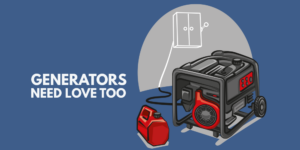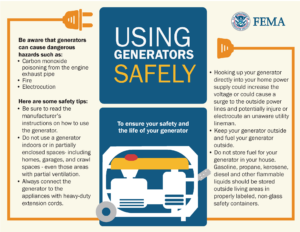
With a potentially busy hurricane season underway and frequent and ongoing WAPA power outages, residents across the V.I. are reminded about how to operate generators safely during an electrical failure.
While generators can be extremely useful when the power is off, improper use can be dangerous and even deadly. A common risk associated with fuel-powered generators is carbon monoxide poisoning.
“Carbon monoxide, also known as CO, is called the ‘invisible killer,’ because it’s a colorless, odorless, poisonous gas,” according to information from the United States Consumer Product Safety Commission. “More than 200 people in the United States die every year from accidental non-fire related CO poisoning associated with consumer products. Nearly 100 of those deaths are linked to portable generators,” the CPSC said.
The CPSC explained that toxic CO fumes released from portable generators operating on fuel, including gasoline, propane, or diesel, can emit high amounts of poisonous gas.
“Many Americans own portable generators to keep the power on after a storm,” the CPSC stated. “However, many people don’t realize that one portable generator [which operates on fuel] can produce the same amount of carbon monoxide as hundreds of cars.”
The CPSC offers the following advice to ensure that a generator is being utilized safely and to avoid exposure to carbon monoxide:
- Never use portable generators inside homes or garages, even if doors and windows are open. Use generators outside only, at least 20 feet away from homes with exhaust facing away.
- Install battery-operated CO alarms or CO alarms with battery backup on every level of the home and outside sleeping areas. Interconnected CO alarms are best; when one sounds, they all sound.
- Know the symptoms of carbon monoxide poisoning: headache, dizziness, weakness, nausea, vomiting, sleepiness, and confusion. If you suspect CO poisoning, get outside to fresh air immediately, and then call 911.
Notably, generators that operate on solar power do not emit any amount of poisonous gas and can be a good option for residents across the territory to consider.

The Federal Emergency Management Agency notes that using a generator can pose additional hazards, including possible electrocution or fire risk. To help avoid an electrical shock, FEMA offers the following safety information:
- Always connect the generator to appliances with heavy-duty extension cords.
- Hooking up your generator directly into your home power supply could increase the voltage or could cause a surge to the outside power lines and potentially injure or electrocute an unaware utility lineman. It also bypasses some of the built-in household circuit protection devices. Connecting the generator to your home could cause a surge in electricity that might result in injury or death to yourself or your family.
- Use a qualified electrician to install the appropriate equipment in accordance with local electrical codes or ask your utility company to install an appropriate power transfer switch.
Additionally, it is essential to operate a generator in a dry area to help avoid the risk of electrocution.
FEMA also shares the following tips to help avoid a potential danger of fire due to generator use:
- Keep your generator outside and fuel your generator outside.
- Do not store fuel for your generator in your house. Gasoline, propane, kerosene, diesel, and other flammable liquids should be stored outside living areas in properly labeled, non-glass safety containers.
- Do not store fuel near a fuel-burning appliance, for example a gas stove.
- If the fuel is spilled or the container is not sealed properly, invisible vapors from the fuel can travel along the ground and be ignited by the appliance’s pilot light or by arcs from electric switches.
- Before refueling the generator, turn it off and let it cool down. Gasoline or other flammable liquids spilled on hot engine parts could ignite, and invisible vapors from the fuel can travel along the ground and be ignited by the generator’s pilot light or by arcs from electric switches in the appliance.

Generator Maintenance
In addition to understanding how to use a generator properly, regular machine maintenance is essential to ensure reliability and safety.
Consumer Reports, described as “an independent, nonprofit member organization that works side by side with consumers for truth, transparency, and fairness in the marketplace,” shares helpful information about generator maintenance. The organization offers recommendations, including testing the machine at least twice a year and emptying the fuel tank when not in use. Replacing and cleaning generator components is also advised.
“In addition to replacing or cleaning all parts, check the engine oil level and add just enough to bring it to the ‘full’ mark on the dipstick,” according to information available online from Consumer Reports. “If you can’t diagnose the generator’s ailment after your test run, contact the company if it’s still under warranty, or reach out to a repair shop,” Consumer Reports added.
The Source spoke with Charlotte Wardell at Import Supply V.I., a generator sales and service business located on St. Thomas. Wardell noted that residents should ensure that all generators meet the qualifications required by the Virgin Islands Department of Planning and Natural Resources to be utilized in the territory.
Wardell also explained that, depending on the type of machine, oil changes should be conducted at least once per year or every 250 hours of use. She advises residents in the territory to keep oil filters on hand during an extended power outage, such as in the aftermath of a hurricane.
A generator should only be used in a dry area, and away from water or wet conditions. Wardell reminds residents never to use a generator during a storm, as this can raise the risk of electrocution.
USVI Weather Information
With a potentially very busy 2024 Atlantic hurricane season occurring, which could increase the chance of weather-related power failures, V.I. residents are advised to monitor the latest forecast information to be prepared. In addition to weather information from the National Weather Service and the Virgin Islands Territorial Emergency Management Agency, a daily weather forecast is also published on the Source Weather Page, where readers can view weather forecast videos and disaster preparedness video segments. Additionally, USVI residents can sign up for alerts from the Virgin Islands Water and Power Authority to stay up to date on power outages.





